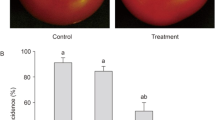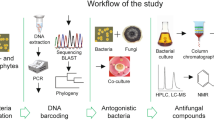Abstract
THE significance of host metabolites in the host relations of Venturia inaequalis and V. pirina, the causal fungi of apple and pear scab respectively, has already been reported1. Further studies have shown that, of the main components of the mixtures of plant phenols in the apple and pear, compounds of the chlorogenic acid type, that is, depsides, probably play an important part. They are toxic to the pathogens at low concentrations, but do exhibit some phytotoxicity when injected in vivo.
This is a preview of subscription content, access via your institution
Access options
Subscribe to this journal
Receive 51 print issues and online access
$199.00 per year
only $3.90 per issue
Buy this article
- Purchase on Springer Link
- Instant access to full article PDF
Prices may be subject to local taxes which are calculated during checkout
Similar content being viewed by others
References
Kirkham, D. S., Nature, 173, 690 (1954).
Kirkham, D. S., Ph.D. thesis (Lond.) and in the press (1955).
Link, K. P., and Walker, J. C., J. Biol. Chem., 100, 379 (1933).
Author information
Authors and Affiliations
Rights and permissions
About this article
Cite this article
KIRKHAM, D., FLOOD, A. Inhibition of Venturia spp. by Analogues of Host Metabolites. Nature 178, 422–423 (1956). https://doi.org/10.1038/178422c0
Issue Date:
DOI: https://doi.org/10.1038/178422c0
This article is cited by
-
Physiology of resistance to fungal diseases in plants
The Botanical Review (1966)
-
über physiologische Ursachen derAscochyta-undMycosphaerella-Resistenz der Erbse (pisum sativum L.)
Der Züchter (1963)
-
Die Bedeutung der Chlorogensäure als Resistenzfaktor des Kartoffelschorfes
Der Züchter (1959)
-
Defence Mechanism of Plants Against Fungi: Fungistatic Properties of Apple Leaf Wax
Nature (1957)
-
A Culture Technique for Venturia Spp. and a Turbidimetric Method for the Estimation of Comparative Sporulation
Nature (1956)
Comments
By submitting a comment you agree to abide by our Terms and Community Guidelines. If you find something abusive or that does not comply with our terms or guidelines please flag it as inappropriate.



